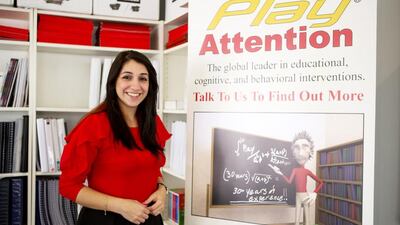ABU DHABI // Focus. Stop fidgeting. Pay attention.
If this what you are constantly telling your child, or yourself, then Emirati businesswoman Haifa Rashed might just have a cure for this lack of concentration.
“I feel like a lot of parents are complaining about their children not focusing or about them forgetting and I have experienced this with my son, so definitely this is an extra aid that will make a difference in people’s lives,” said Ms Rashed.
She said her firm, Know How for Management Consulting, is the first company in the Arabian Gulf region to offer children and adults specialised brain training meant to boost cognition using Play Attention.
The computer programme was developed by an American teacher to help students with attention deficit hyperactivity disorder (ADHD) to focus in class.
“We’re not just talking about ADHD here,” said Play Attention specialist Suzan Sherif. “It can be for normal people who have memory problems – they don’t remember names, they don’t remember numbers, emails and things like that.
“Same with children who can’t pay attention in classrooms when their teacher is talking. This is a programme that will actually help them to sustain their attention, focus more and improve their life skills.”
It takes about an hour of practice a week, broken up into two sessions of 30 minutes or four classes of 15 minutes, depending on one’s age and level of cognition.
The programme works by strapping a sensor – an electronic device called Body Wave, about the size of a deck of cards – to the participant’s arm. The sensor tracks their brainwaves and wirelessly transmits the information to the computer, allowing the person to control elements of the digital exercises with his or her brain.
“Just like when you’re going to the gym, you’re improving your muscles, but here we’re improving your brain muscles,” Ms Sherif said. “Children see it as a game. It’s a game exercise, it’s not something hard like maths and numbers and you have to memorise everything. It’s just a simple exercise, but it’s very intensive.”
Participants have to master 18 exercise games to complete the programme. The exercises use video-game-like computer graphics to depict different scenes where the student has to concentrate to move objects in a quest for points and, ultimately, greater brain function.
One exercise, called Attention Stamina, is an underwater adventure where the student animates a character of his choosing – a dolphin, scuba diver or submarine – by concentrating on it.
If the participant’s concentration breaks, the character stops swimming and floats up to the surface. But if they maintain a steady focus, the character continues its underwater excursion collecting coins from the ocean floor.
“The goal is to work up to five minutes of maintaining a steady concentration rate of 75 per cent or higher. A bar in the top left of the screen shows the level of concentration used.
“What you need to do is just ignore everything in your brain and focus on the submarine, look at the submarine. When you start to think only about the submarine, it will start swimming to the bottom,” said Ms Sherif, as she guided a user through the exercise.
“Each level basically is going to get more complicated. We’re going to see more fish around that try to distract you. Sometimes you’re going to see an octopus that comes from the bottom, and as soon as you see the octopus, you need to click on it with the space bar, so all of these instructions are going to get harder later on.
“But for the first level, this exercise targets sustaining attention because we have 18 exercises and each one does something different.”
Anyone over the age of six can sign up for the course, taught at the Know How officein Al Zahiyeh. The programme is also available for sale to clients who wish to practise at home. It comes with 24/7 technical support. American teachers are also on call to offer analysis of the home student’s performance for free.
“This is for anyone who actually wants to improve and anyone who wants to excel in what they’re doing,” Ms Sherif said, noting that it takes 12 hours of practice for change to take effect in one’s attention span. “You’re improving your skills. You’re improving your attention, you’re improving your memory, you’re multitasking, everything.”
rpennington@thenational.ae

